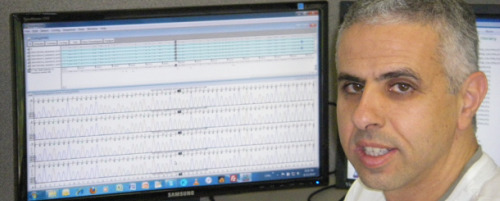A joint Israeli-US team has isolated a genetic biomarker for a potentially fatal kidney disease that could lead to new therapeutic approaches and save more lives.

Israeli and American researchers have identified a new biomarker that can help America’s medical community to predict who is likely to develop ESKD – a potentially fatal, end-stage kidney disease most prevalent among Black Americans.
It’s well known in the US that in areas where there are equal numbers of blacks and whites, more people of African descent will be tying up a hospital’s dialysis machines, followed by those of Latino heritage, with whites in the minority for this condition, says Dr. Doron Behar of the Rambam Medical Center in Haifa, co-author of the new study.
The Israeli scientists studied data from hospitals in the New York region pertaining to Black Americans and Hispanics who could have originated anywhere in the US.
In the previous two years American scientists had traced a genetic link to Africa, when they discovered that ESKD (End Stage Kidney Disease) is associated with the gene MYH9 found on chromosome 22, which explains the higher prevalence of the disease in those of African Hispanic descent. Previously, scientists had attributed this phenomenon to environmental factors such as culture, or diet.
In North America alone there are about 40 million people with chronic kidney disease at varying stages of development. About half of these will go on to develop ESKD. The toll on the healthcare system is enormous and the pain and suffering from treatments and the wait for a transplant can be almost unbearable.
A fascination with faces
According to the literature, ESKD requires either long-term dialysis or a kidney transplant to keep patients alive and remains fatal in parts of the world where such advanced treatments are not available. Black Americans have about a four-fold higher rate of developing the end-stage disease, and Hispanic-Americans an approximately two-fold higher rate, than Americans of European ancestry.
The new collaborative study, published in a recent issue of the journal Human Molecular Genetics, was led by Prof. Karl Skorecki, a nephrologist at Rambam Hospital, and a researcher at the Technion – Israel Institute of Science, in partnership with student Shay Tzur, colleagues from the Technion and Tel Aviv University, Dr. Walter Wasser, an American-Israeli now at Hadassah Hospital in Jerusalem, who brought the study to Israel, and the US National Institutes of Health.
Co-author Behar, a critical care medical doctor and a PhD in population genetics, who is a partner in the US company Family Tree DNA, tells ISRAEL21c that this latest study could serve as a new test to identify who is at risk for ESKD. The team of researchers discovered variations of the gene appearing in Western and South Africa, and less in Hispanic populations. They also discovered a very strong predictor within the gene MYH9 which can serve as a medical biomarker to help say who is likely to develop this potentially fatal disease.
Behar’s interest in population genetics stems from his attraction to looking at people from different cultures. He’s always snapping photos of different types of people around the world, and in some of his earlier research Behar investigated the genetics of those with Jewish ancestry. In one study, he linked all European Ashkenazi Jewish women to four females. “It was natural to start with my own people,” admits Behar, whose Jewish family is of Egyptian descent.
The MYH9 research “started with epidemiological inspection,” Behar recounts. “Medical doctors in the US – nephrologists – noticed that if a patient enters their clinic and is known to have HIV and is of African American ancestry they’ll have up to an 18 times greater chance of developing kidney disease, a specific variant associated with HIV.”
New therapeutic approaches
Anecdotally, however, the risk is known to be even higher, at about a 50 times greater chance for developing kidney disease, compared to European Americans with HIV. Since this was so easy to observe at dialysis centers in the US where there are mixed populations, geneticists took notice and looked for genetic reasons to explain the patterns seen in hospitals and clinics.
The genetic association uncovered by the American researchers was reinforced by the collaborative Israel-based team. Unlike cystic fibrosis, which can be turned on with two copies of a defective gene, the effects in the genes of end-stage kidney disease are associative, pointing out a risk, not necessarily a fact, that the disease will occur, Behar explains.
Even if a person has the biomarker for ESKD, “It’s not certain that you will develop the disease,” says Behar. “Our paper extended this. It’s known that Hispanic Americans have an intermediate chance between African Americans and white Caucasians to develop [ESKD]. And Hispanics do share African ancestry, but to a lesser extent than African Americans, so then also among Hispanics we will find some variation. We wanted to document it and found the biomarker, which almost never occurs in white Caucasians or Chinese-Asians. To some extent it’s in Spanish Americans, but it’s very prevalent in African Americans.”
Now that this genetic biomarker has been isolated, new opportunities open up in therapeutic approaches. For example, HIV-associated end-stage kidney disease is the most common form of kidney failure in people with this biomarker. Knowing who is at risk can help physicians prescribe the appropriate medication to minimize damage to kidneys, as certain drugs can actually cause severe kidney damage in some people.
Interestingly, four years earlier the Israeli scientists in the study found that unlike African-Americans, Ethiopian Africans appear to be protected from end-stage kidney disease. This suggests that something in their genes, also African at the core, may hold the clue as to how kidney health is genetically programmed.
Behar expects that the genotyping of those who come to their clinics will help nephrologists to save more lives, by providing them with the information to understand and evaluate the risks that their patients may be facing.












